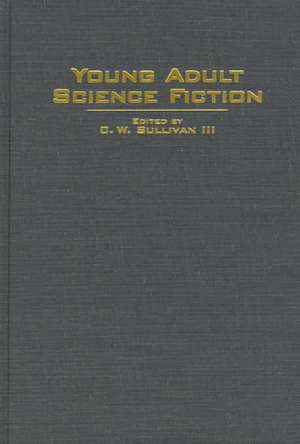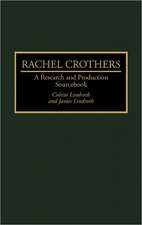Young Adult Science Fiction: Contributions to the Study of Science Fiction and Fantasy
Autor C. W. Sullivan IIIen Limba Engleză Hardback – 29 mar 1999 – vârsta până la 17 ani
Din seria Contributions to the Study of Science Fiction and Fantasy
- 19%
 Preț: 459.84 lei
Preț: 459.84 lei - 28%
 Preț: 363.38 lei
Preț: 363.38 lei - 24%
 Preț: 461.87 lei
Preț: 461.87 lei - 38%
 Preț: 437.40 lei
Preț: 437.40 lei - 38%
 Preț: 440.53 lei
Preț: 440.53 lei - 28%
 Preț: 437.40 lei
Preț: 437.40 lei - 34%
 Preț: 318.21 lei
Preț: 318.21 lei - 24%
 Preț: 462.87 lei
Preț: 462.87 lei - 24%
 Preț: 460.68 lei
Preț: 460.68 lei - 27%
 Preț: 345.74 lei
Preț: 345.74 lei - 28%
 Preț: 344.05 lei
Preț: 344.05 lei - 27%
 Preț: 345.42 lei
Preț: 345.42 lei - 28%
 Preț: 462.12 lei
Preț: 462.12 lei - 27%
 Preț: 439.09 lei
Preț: 439.09 lei - 38%
 Preț: 438.00 lei
Preț: 438.00 lei - 24%
 Preț: 462.20 lei
Preț: 462.20 lei - 38%
 Preț: 437.47 lei
Preț: 437.47 lei - 24%
 Preț: 366.92 lei
Preț: 366.92 lei - 28%
 Preț: 435.65 lei
Preț: 435.65 lei - 35%
 Preț: 460.60 lei
Preț: 460.60 lei - 27%
 Preț: 345.15 lei
Preț: 345.15 lei - 27%
 Preț: 439.51 lei
Preț: 439.51 lei - 24%
 Preț: 460.76 lei
Preț: 460.76 lei - 27%
 Preț: 345.30 lei
Preț: 345.30 lei - 38%
 Preț: 345.67 lei
Preț: 345.67 lei - 30%
 Preț: 568.40 lei
Preț: 568.40 lei - 28%
 Preț: 434.53 lei
Preț: 434.53 lei - 28%
 Preț: 461.43 lei
Preț: 461.43 lei - 24%
 Preț: 461.00 lei
Preț: 461.00 lei - 28%
 Preț: 438.07 lei
Preț: 438.07 lei - 28%
 Preț: 436.47 lei
Preț: 436.47 lei - 28%
 Preț: 436.40 lei
Preț: 436.40 lei - 28%
 Preț: 412.21 lei
Preț: 412.21 lei - 38%
 Preț: 440.20 lei
Preț: 440.20 lei - 28%
 Preț: 435.72 lei
Preț: 435.72 lei - 28%
 Preț: 362.37 lei
Preț: 362.37 lei - 28%
 Preț: 437.67 lei
Preț: 437.67 lei - 28%
 Preț: 461.69 lei
Preț: 461.69 lei - 28%
 Preț: 435.72 lei
Preț: 435.72 lei - 38%
 Preț: 438.24 lei
Preț: 438.24 lei - 28%
 Preț: 436.57 lei
Preț: 436.57 lei - 24%
 Preț: 462.03 lei
Preț: 462.03 lei - 28%
 Preț: 344.63 lei
Preț: 344.63 lei - 30%
 Preț: 593.40 lei
Preț: 593.40 lei - 37%
 Preț: 579.52 lei
Preț: 579.52 lei - 28%
 Preț: 436.57 lei
Preț: 436.57 lei - 28%
 Preț: 459.84 lei
Preț: 459.84 lei - 24%
 Preț: 459.41 lei
Preț: 459.41 lei - 35%
 Preț: 363.22 lei
Preț: 363.22 lei
Preț: 437.84 lei
Preț vechi: 604.23 lei
-28% Nou
Puncte Express: 657
Preț estimativ în valută:
83.78€ • 87.71$ • 69.32£
83.78€ • 87.71$ • 69.32£
Carte tipărită la comandă
Livrare economică 05-19 aprilie
Preluare comenzi: 021 569.72.76
Specificații
ISBN-13: 9780313289408
ISBN-10: 0313289409
Pagini: 264
Dimensiuni: 156 x 235 x 25 mm
Greutate: 0.52 kg
Ediția:New.
Editura: Bloomsbury Publishing
Colecția Praeger
Seria Contributions to the Study of Science Fiction and Fantasy
Locul publicării:New York, United States
ISBN-10: 0313289409
Pagini: 264
Dimensiuni: 156 x 235 x 25 mm
Greutate: 0.52 kg
Ediția:New.
Editura: Bloomsbury Publishing
Colecția Praeger
Seria Contributions to the Study of Science Fiction and Fantasy
Locul publicării:New York, United States
Notă biografică
C.W. SULLIVAN III is Professor of English at East Carolina University. His previous books include The Dark Fantastic: Selected Essays from the Ninth International Conference on the Fantastic in the Arts (1997), and Science Fiction for Young Readers (1993), and Welsh Celtic Myth in Modern Fantasy (1989), all available from Greenwood Press.
Cuprins
PrefaceIntroductionHistory and CriticismTechnological Fiction for Youth: 1900-1940 by Francis J. MolsonAmerican Y.A. Science Fiction Since 1947 by C.W. Sullivan IIIYoung Adult Science in Canada by Greer WatsonThe Janus Perspective: Science Fiction and the Young Adult Reader in Britain by K.V. Bailey and Andy SawyerGerman Science Fiction for Young Adults by Franz RottensteinerAustralian Science Fiction for Children and Adolescents by John FosterTopical ApproachesThe Young Adult Science Fiction Novel as Bildungsroman by Michael M. LevyWomen in Heinlein's Juveniles by Marietta A. FrankYoung Adults, Science Fiction, and War by Martha BartterNo Grownups, Please: A Study of the American Science Fiction Film by James Craig HolteScience Fiction in Comic Books: Science Fiction Colonizes a Fantasy Medium by Donald PalumboBibliographyHistory and Criticism by Michael M. Levy














